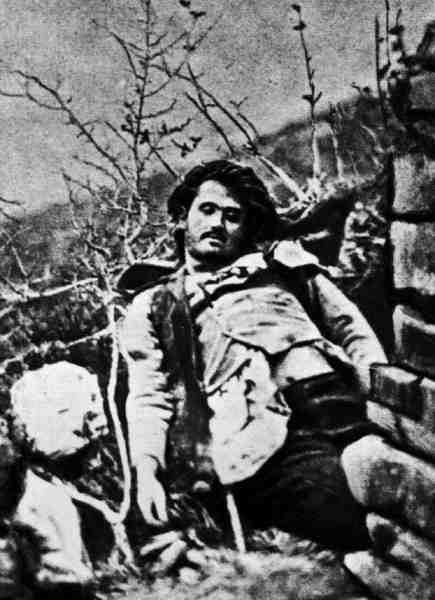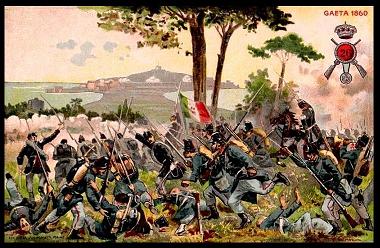 e The Neapolitan army retreated, as has been already stated, beyond the Garigliano(above). Capua, isolated and surrounded, could render no material service to the royal cause; it capitulated on the 2nd of November, though not until the town had been bombarded for forty-eight hours. The siege was witnessed by Victor Emmanuel, who said to General Delia Rocca: 'It breaks my heart to think that we are sending death and destruction into an Italian town.' Two days after the surrender of Capua, Cialdini threw a bridge over the Garigliano near its mouth, an operation covered by the guns of Admiral Persano's (right)squadron.
e The Neapolitan army retreated, as has been already stated, beyond the Garigliano(above). Capua, isolated and surrounded, could render no material service to the royal cause; it capitulated on the 2nd of November, though not until the town had been bombarded for forty-eight hours. The siege was witnessed by Victor Emmanuel, who said to General Delia Rocca: 'It breaks my heart to think that we are sending death and destruction into an Italian town.' Two days after the surrender of Capua, Cialdini threw a bridge over the Garigliano near its mouth, an operation covered by the guns of Admiral Persano's (right)squadron. 
His first attempt on the 29th of October had met with a decided repulse, another proof that this last remnant of the Neapolitan army was not an enemy to be despised. The second attempt, however, was successful; part of the Neapolitans fell back upon Gaeta, and the other part fled over the Papal frontier. But the losers of all major battles against the Austrians tried to use a big and ugly stick against the Bourbons.


On August 14, 1861 the towns of Pontelandolfo and Casalduni were sacked and torched by the Piedmontese military during the so-called "war against brigandage" in Southern Italy. On the orders of General Enrico Cialdini (above) the towns were reduced to rubble and townspeople indiscriminately slaughtered in retaliation for the death of 41 soldiers at the hands of partisan loyalists. Accounts of the Piedmontese reprisal describe the shooting of unarmed men and bayoneting of groveling women. The survivors were left homeless and without means of survival. Dispatched by Cialdini, Colonel Gaetano Negri telegraphed his superior to report on the carnage: "At dawn yesterday justice was done to Pontelandolfo and Casalduni. "Sadly, Pontelandolfo and Casalduni were not the exception. In the first 14 months after the conquest of Southern Italy the towns of Guaricia, Campochiaro(above), Viesti, San Marco in Lamis, Rignano, Venosa, Basile, Auletta, Eboli, Montifalcone, Montiverde, Vico, Controne, and Spinello all suffered a similar fate.
 Arbitrary arrests and summary executions were common. By 1864 over 100,000 troops, nearly half the Italian army, were deployed in the South to try and keep order
Arbitrary arrests and summary executions were common. By 1864 over 100,000 troops, nearly half the Italian army, were deployed in the South to try and keep order The Massacred
The Massacred.Despite attempts to prove otherwise (so they could politically justify Piedmontese atrocities) the insurrection was not the work of common criminals and brigands, but was in fact a popular revolt by former Bourbon soldiers, loyalists and desperate peasants against the Northern invaders.
 gaeta
gaetaThese resistance fighters were protecting their homes and families. As many as 80,000 Southerners were imprisoned for political reasons. It was only after the floodgates of immigration opened in the decades after "unification" and large parts of the South were depopulated that the violence began to wane. Unfortunately, due to unreliable figures, the exact number of Southerners killed during the "war against brigandage" will never be known.Gaeta, the refuge of the Pope and the fugitive Princes in 1848, now became the ultimate rock of defence of the Bourbon dynasty.
 MONTEFABBRI – 11 gennaio 1861 h. 12,30. The Grossi gang of Brigands hit town
MONTEFABBRI – 11 gennaio 1861 h. 12,30. The Grossi gang of Brigands hit town For a month, 10,000 out of the 20,000 besiegers were at work with the spade. The defending force amounted to 11,000 men, and was commanded by General Ritucci. From the first, it was certain that the obstinate stand made at Gaeta could only result in what Lord John Russell called a useless effusion of blood; nevertheless it seems to have been prompted by a real belief that Francis would still recover his kingdom. The precedent of his father's return from Gaeta may have strengthened the King's illusion; every day he received highly-coloured reports of a gathering reaction, and as the French fleet in the bay prevented Admiral Persano from attacking from the sea, he believed that the time which he could hold out was indefinite.

This policy of the French Government need not have greatly cheered him, as its motive was less to help Francis than to prepare the way, by hampering the Piedmontese, for a little fishing in troubled waters.
Garibaldians from the film THE LEOPARD
Prince Murat, descendant of the Beau Sabreur, was busy writing proclamations to remind the world that if Francis were impossible and Victor Emmanuel 'wanted finish,' there was an eligible young man ready to sacrifice the charms of the Boulevards for the cares of kingship.

bersaglieri
On the representations of the British Government the Emperor withdrew his fleet in January, advising Francis II. to renounce a hopeless resistance. But at this eleventh hour the King had adopted the principle of 'no surrender,' and he meant to stick to it.

It is difficult to blame him; at any rate, much more serious is the blame due to the methods of warfare which he was to adopt or to approve thereafter. His young Queen, who was frequently seen on the ramparts encouraging the artillerymen at their guns, had probably much to do with his virile resolution.
 Bourbon Cavalry trumpeter
Bourbon Cavalry trumpeterThe fortress was now attacked by land and by sea, and the bursting of a powder-magazine inside the walls hastened its doom.

On the 15th of January the Neapolitans laid down their arms, the King having left his dominions by sea. The first act of the conquerors in the half-ruined town was to attend a mass for the repose of the souls of those who had fallen.The telegram announcing the fall of Gaeta went to Caprera; Garibaldi read it, and a weight was taken off his mind. 'Civil war is at an end,' he announced to the little party round the supper-table; 'Cialdini with our army is in Gaeta; now the Italians will not cut one another's throats any more.' Later in the evening he seemed so depressed that they thought him ill; Colonel Vecchj went to his bedside to discover what was the matter.
He found him reading the Times, and inquired why he had become so suddenly sad. After a pause, Garibaldi said: 'Poor boy! Born at the foot of a throne and perhaps not by his own fault, hurled from it. He too will have to feel the bitterness of exile without preparation.' 'Is that all?' asked Vecchj. 'Do you think it nothing?' was the answer. 'Why then,' persisted Vecchj, half in jest, 'did you go to Marsala?' 'It was the duty of us all to go,' Garibaldi said quickly, 'else how could there have been one Italy?'
Francis II. would have been happy had he found counsellors to persuade him to keep pure such titles to sympathy as he then possessed. Decorum, if not humanity, should have urged him to retire, surrounded by the solitary flash of glory cast on his fallen cause by the brave defence of Gaeta. But the revolution, the new Islam, if it could not be conquered must be made to suffer for its triumph. Hence the exiled King was advised to call in murder, pillage and rapine as accomplices.
.jpg)
The political brigandage which followed the downfall of the King of the Two Sicilies began after the battle of the Volturno and extended over five years. Its effect on the general situation was nil; it harassed and distracted the Italian Government and created the necessity of using severe repressive measures, but it never placed the crown in danger.

One effect it did have, and that was to raise a feeling of reprobation for the late dynasty, which not all the follies of the two Ferdinands and the first Francis had succeeded in evoking. Nowhere was the seemliness of death for native land better understood than it has been in the Italy .
 Bourbon Chasseur. Model sold over period of time at newsagents in Italy in 2005
Bourbon Chasseur. Model sold over period of time at newsagents in Italy in 2005
No comments:
Post a Comment